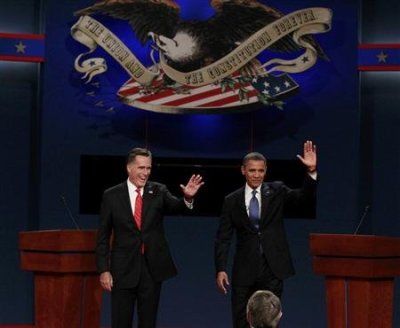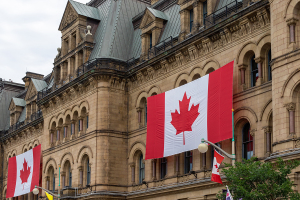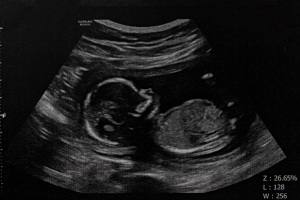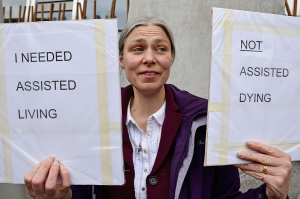Romney vs. Obama: Where They Stand on Religious Freedom
Editor's note: In this series comparing the positions of both major party presidential candidates on a range of issues, each candidates platform will be described using information from the candidate's themselves, mostly from the candidate's websites. A candidate's description of their opponent's position will not be used. In describing the candidate's position, The Christian Post does not attest to the facts stated as part of the position.

President Barack Obama and Mitt Romney have both promised the American people that they will fight to preserve and uphold religious freedom in the country, but both have also faced sharp criticism for their stance on key religious issues.
Obama has professed his Christian faith multiple times, and attends Evergreen Chapel at Camp David near Washington, D.C., for worship.
"I believe in the redemptive death and resurrection of Jesus Christ. I believe that that faith gives me a path to be cleansed of sin and have eternal life. But most importantly, I believe in the example that Jesus set by feeding the hungry and healing the sick and always prioritizing the least of these over the powerful," Obama declared in Jan. 2008 to Christianity Today.
On his official campaign website, the president has an entire section devoted to religion called People of Faith. On it, he highlights his commitment to religious freedom, and has a video massage where he narrates the history of religion in America and re-states his pledge to defend religious liberties.
"In a changing world, my commitment to protecting religious liberty is and always will be unwavering. As American's diversity grows, we have a chance to reaffirm the pluralism that has defined us as a nation. A pluralism expansive enough to protect the rights of all to speak their minds and to follow their conscious," Obama says in the ad.
Evangelical Christians, however, have questioned Obama for his stance on issues such as same-sex marriage and abortion, which they say goes against traditional Christian beliefs. Back in May, Obama declared his support for same-sex marriage, and has refused to defend the Defense of Marriage Act signed by former President Bill Clinton. Obama is also a pro-choice president, and has said that he will defend the Roe vs. Wade 1973 Supreme Court decision that legalized abortion in the country.
Catholic institutions are also suing the Obama administration over the HHS contraception mandate that he has pushed for. The legislation forces religious employers to provide birth control insurance to employees, which is against Roman Catholic doctrine. The White House has said that some churches who meet certain requirements may be exempted from the mandate, but Cardinal Timothy Dolan, president of the U.S. Conference of Catholic Bishops and Archbishop of New York, has spoken out strongly against the plan.
"I worry that members of [Obama's] administration might not particularly understand our horror at the restricted nature of the exemption that they're giving us, that for the first time we can remember, a bureau of the federal government seems to be radically intruding on what the term of a church is," Dolan remarked, adding that if pressed to offer this insurance, some Catholic Charities may even have to stop their services to the poor and needy.
Mitt Romney, a devout Mormon who has served as a missionary for the Church of Jesus Christ of Latter-day Saints, has said that he will stand up against Obama precisely on those issues.
Romney has stated his support for the traditional definition of marriage as a union between one man and one woman, and has said that he will fight to reverse Roe vs. Wade, as well as cut funding to Planned Parenthood, the largest abortion provider in the country.
On his official website, Romney lists his values concerning traditional stances on abortion, marriage and stem-cell research, where he promises to protect life and the family unit.
"Americans have a moral duty to uphold the sanctity of life and protect the weakest, most vulnerable and most innocent among us. As president, Mitt will ensure that American laws reflect America's values of preserving life at home and abroad," Romney notes.
Romney has also been backed by the Becket Fund for Religious Liberty.
"The charge that Mitt Romney has not stood tall to defend freedom of religion is preposterous... people of all faiths won't find a more ardent or effective advocate than Mitt Romney. He has shown backbone on every critical issue at every juncture when it counted," said Mary Ann Glendon, Chair of the Board of the Becket Fund.
The GOP candidate has directly stated that he will oppose Obama's HHS mandate and remove the insurance requirement for religious institutions.
"President Obama has declared war on religion by forcing religious institutions to go against their faith. Mitt Romney and Paul Ryan will stand up and protect religious freedom whenever and wherever it is threatened," his campaign promises.
Although he maintains that he will be a pro-life leader, Romney has faced some criticism from evangelicals who are concerned that his stance on abortion does not precisely match the Republican Party platform and conservative ideals. The GOP platform wants to make all abortion illegal, except when the mother's life is danger, but Romney has said that it still should be permitted in cases of rape or incest.
A number of evangelicals have also insisted that Mormonism cannot be considered a part of mainstream Christianity, and a Romney presidency would promote what they call a "cult."
Pastor Robert Jeffress of First Baptist Church in Dallas, who has backed Romney despite first opposing his candidacy, has said that the GOP candidate should be supported because he is "the lesser of two evils" for Christians voting in November.
"The fear among evangelicals is that this would legitimize a religion that we believe doesn't lead people to God," said Jeffress, who leads an 11,000-strong congregation.
"And so those of us who have said yes (to Romney), we're going to support him as the lesser of two evils, but at the same time, we're making very clear that we're doing so realizing Mormonism is not Christianity."
It is likely that Romney and Obama will face questions on religious liberty during the next presidential debate on Tuesday night at Hofstra University in Hempstead, N.Y., which will feature a town-hall style discussion on foreign and domestic policy, with the candidates taking direct questions from citizens.
READ: OBAMA ADDRESSES RELIGIOUS FREEDOM, BUT A LOT LEFT UNSAID REGARDING INTOLERANCE





























